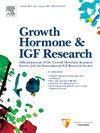Identification and differentiation of somapacitan, a long-acting growth hormone derivative, and recombinant human growth hormone in equine plasma by LC-HRMS for doping control purpose
IF 1.6
4区 医学
Q4 CELL BIOLOGY
引用次数: 0
Abstract
Somapacitan, a long-acting growth hormone derivative, and recombinant human growth hormone (rhGH) are protein-based drugs generally used to treat growth disorders and GH deficiency in humans. Due to their potential to enhance the horse performance, the use of these drugs is prohibited at-all-times by the International Federation of Horseracing Authorities for horseracing and the Fédération Equestre Internationale for equestrian sports. In this study, we developed a test method for the identification and differentiation of somapacitan and rhGH in equine plasma by using liquid chromatography high-resolution mass spectrometry (LC–HRMS). The method involved C4 solid-phase extraction after ammonium sulfate precipitation, followed by chloroform/methanol precipitation, trypsin digestion, and analysis by LC-HRMS. The discriminative identification of somapacitan and rhGH was successfully achieved through the detection of their respective unique T10 peptide fragments. Noteworthy, the T10 peptide fragment of somapacitan was detected with its side chain structure remaining intact. The limit of identification (confirmation) (LOI) was determined to be 5 ng/mL for somapacitan and 2 ng/mL for rhGH in equine plasma, while the limit of detection (LOD) was 5 ng/mL for somapacitan and 1 ng/mL for rhGH. Furthermore, using the peptide fragments T1, T8, and T9 (which are shared between somapacitan and rhGH), the presence of somapacitan in equine plasma could be confirmed with higher sensitivity, achieving down to LOIs of 2 ng/mL and LODs of 1 ng/mL. The method was validated with respect to specificity, identification capability, robustness, precision, and reproducibility, paving the way for the analysis of post-administration samples from our already planned administration trials and future potential positive cases.
hplc - hrms鉴别马血浆中长效生长激素衍生物somapacitan和重组人生长激素
Somapacitan是一种长效生长激素衍生物,重组人生长激素(rhGH)是一种基于蛋白质的药物,通常用于治疗人类生长障碍和生长激素缺乏症。由于这些药物有可能提高马匹的表现,国际赛马当局联合会和国际马术协会在任何时候都禁止使用这些药物。本研究建立了马血浆中somapacitan和rhGH的液相色谱-高分辨率质谱(LC-HRMS)鉴别鉴别方法。方法采用硫酸铵沉淀后C4固相萃取,氯仿/甲醇沉淀,胰蛋白酶消化,LC-HRMS分析。通过检测其各自独特的T10肽片段,成功实现了somapacitan和rhGH的鉴别鉴定。值得注意的是,somapacitan的T10肽片段被检测到,其侧链结构保持完整。马血浆中somapacitan的检出(确认)限为5 ng/mL, rhGH的检出限为2 ng/mL, somapacitan的检出限为5 ng/mL, rhGH的检出限为1 ng/mL。此外,利用somapacitan和rhGH共有的肽片段T1、T8和T9,可以以更高的灵敏度确认马血浆中somapacitan的存在,LOIs可低至2 ng/mL, LODs可达1 ng/mL。该方法在特异性、鉴定能力、稳健性、精确性和重复性方面得到了验证,为分析我们已经计划的给药试验和未来潜在阳性病例的给药后样本铺平了道路。
本文章由计算机程序翻译,如有差异,请以英文原文为准。
求助全文
约1分钟内获得全文
求助全文
来源期刊

Growth Hormone & Igf Research
医学-内分泌学与代谢
CiteScore
3.30
自引率
0.00%
发文量
38
审稿时长
57 days
期刊介绍:
Growth Hormone & IGF Research is a forum for research on the regulation of growth and metabolism in humans, animals, tissues and cells. It publishes articles on all aspects of growth-promoting and growth-inhibiting hormones and factors, with particular emphasis on insulin-like growth factors (IGFs) and growth hormone. This reflects the increasing importance of growth hormone and IGFs in clinical medicine and in the treatment of diseases.
 求助内容:
求助内容: 应助结果提醒方式:
应助结果提醒方式:


